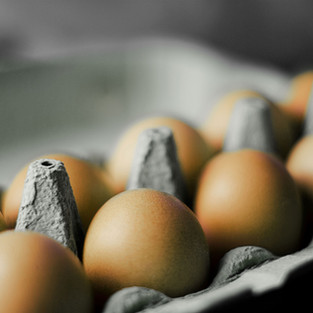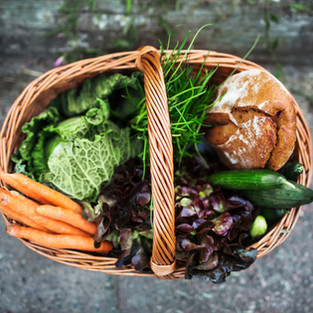There are lots of food related terms that are used extensively with inferred benefits but what do they really mean and are they actually superior? We have taken 3 everyday buzz words and created explanations for you so you can make up your own minds.
ORGANIC
According to the Soil Association, organic food is 'food as it should be' which we think is a nice way of summing it up - food that is grown or animals that are reared without any unnatural intervention - just as nature intended.
"All organic food is fully traceable from farm to fork, so you can be sure of what you’re eating. The standards for organic food are laid down in European law so any food labelled as organic must meet strict rules. Unlike non-organic food production, which makes wide use of manufactured and mined fertilisers and pesticides, organic food is produced with natural fertilisers from plants, less energy and more respect for the animals that provide it."
[Source: https://www.soilassociation.org/organic-living/whatisorganic/]
And obviously this is excellent news for consumers. Often though, buying organic can be more expensive as organic farms are typically smaller and production usually takes longer as growth hormones are not used. However, it is possible to buy produce that is neither organic or non-organic. Many smaller producers avoid the use of pesticides and chemicals but can't afford to invest fully in organic certification. It is worth investigating suppliers who stock such products and this can often lead you back to your local greengrocer should you be lucky enough to still have one.
LINE-CAUGHT

2 Michelin star chef Sebastien Lepinoy commissions a fisherman in France to catch the fish for his restaurant, Les Amis, using traditional methods. He states his reasons why:
There have been many cases of destructive practices in commercial fishing causing harm to marine life, and endangering many species of fish. In comparison, line-fishing is a more sustainable method as it is done on a much smaller scale and hence, does not result in any unwanted by-catch.
[Source: https://guide.michelin.com/sg/people/industry-insider-cooking-with-line-caught-fish/news]
He also goes on to explain that line-caught fish is usually stored for less time and also that small, unusable fish can be returned to the sea for better sustainability.
Of course, for us mere mortals line-caught fish cooked by a French award-winning chef is probably not an everyday occurrence but it is absolutely possible to buy line-caught fish from the fishmongers or supermarket if it is something that your conscience (and palette) demands.
FREE-RANGE
Free-range is such a long-winded term to explain that we've left it till last! The Guardian explains that if a hen has been inside for more than 12 weeks (3 months) then it can no longer be considered free-range. Wow, indoors for 3 months - that doesn't seem right somehow? The RSPCA states that requirements for free-range hens = no more than 9 hens per square metre, 10cm of feeder per bird and one drinker for 10 birds. The grading is ambiguous which is confusing for the consumer. However a rule of thumb shows that Soil Association eggs, with a rating of 70%, are your best bet (British Lion eggs only get a rating of 33 out of 100 and RSPCA Assured = 63 out of 100).
For free-range meat, the RSPCA states:
that chickens must have a defined amount of space (no more than 13 birds a square metre), be 56 days old before they are slaughtered and have continuous daytime access to open-air runs, with vegetation, for at least half their lifetime. There are no such regulations for pork...
As cows and sheep tend to spend part of the year outside anyway, the RSPCA suggests consumers look for meat that is labeled 'grass-fed' and Soil Association accredited.
The point of this article isn't to promote or decry anyone's choices but to explain the common terms that we are all using but that are actually more confusing than we might expect! At The Green Door we choose excellent quality products that can be traced from their origins to the food we serve you. We always aim to use chemical-free, ethically produced ingredients but wouldn't ever claim to be an organic supplier despite often using organic products. Sometimes it's best to use common sense and do the best you can with the budget and product availability open to you. It seems that some of the over-used terms, especially 'free-range', aren't as good as we had all hoped they were.
We, as a business, believe we should supply the best quality ingredients and food we can and will always strive to use as local as possible - Trisha McCann, The Green Door






